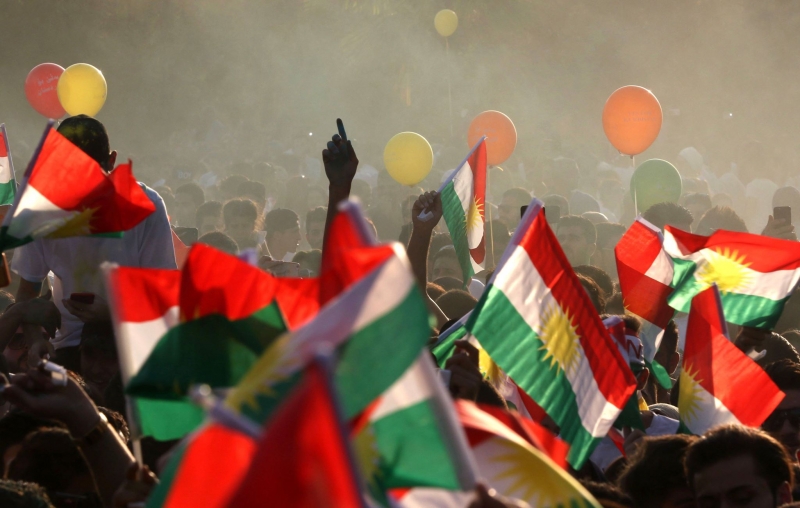Today marks the first anniversary of the historic independence referendum of the Kurdistan Region, a move that the Kurds view as a landmark in the modern history of Kurdish struggle for freedom. Twelve months on, the political situation in the region has undergone major changes, but what exactly happened?
On 7 June 2017, most of the political parties in the Kurdistan Region gathered to establish the Referendum High Council, and later announced 25 September as the day for the vote. The effort was spearheaded by the then Kurdistan President Masoud Barzani. They all agreed that the time had come for the people of Kurdistan to decide on their fate: to stay with Iraq or go for statehood.
It was such a major and momentous decision that the international community, neighboring states, and many political leaders in Baghdad did not believe that the Kurds would proceed with that. They, from the beginning until hours before the referendum day, were pushing the Kurdish political leaders to delay the vote, arguing that the timing of the referendum was “not right”.
Erbil was determined to make it happen, saying that political coexistence with Iraq was no longer possible as the Iraqi government had already violated 55 articles from the constitution, mainly those which were related to the rights of the people of Kurdistan.
“If we cannot be good political partners, then let’s be good neighbors,” Barzani repeatedly said, indicating the goodwill behind the referendum, implying that Erbil seeks no war, but an amicable divorce.
The tension between Erbil and Baghdad, in fact, started escalating in 2014 when the then prime minister of Iraq, Nouri al-Maliki, cut Kurdistan’s share from Iraq’s federal budget. The pressure continued throughout the costly war against the Islamic State (IS), in which the Peshmerga forces of the Kurdistan Region played a decisive role alongside the US-led Coalition forces.
Between June and September 2017, the traffic of diplomatic delegations to Erbil increased. President Barzani and Chancellor of Kurdistan Region Security Council (KRSC), Masrour Barzani, were receiving several delegations from the US, EU, Gulf states, and Baghdad almost on a daily basis. But none of them could offer a realistic alternative for the referendum to the Kurds.
Huge rallies were being held across Kurdistan Region. The Kurds in diaspora also played an important role by organizing rallies across EU and in the US, bringing the case into the spotlight of the public attention.
The neighboring states, Iran and Turkey on the top, were also deeply concerned. They were primarily worried about the fact that millions of Kurds are living in each of the countries, and having an independent Kurdistan on their borders could encourage the Kurdish population there to move towards asking for independence.
The US tried to put some options on the table, arguing that the referendum could distract the efforts aimed at defeating the Islamic State. However, the Kurds saw none of the options as realistic enough that could guarantee the rights of the people of Kurdistan.
“The referendum will be held on time with no postponement,” Kurdistan leadership responded to the pressures.
The people of Kurdistan were very excited about the independence vote that many of them queued outside the polling stations the night before 25 September. On the day of the referendum, it was proven to the world that no external pressure could succeed if there is unity from inside. A total of 3,305,925 people (72.16% turnout) poured into the polling stations and casted their votes. 92.73% of them voted in favor of independence.
Seeing the strong determination of the Kurds, the neighboring states and Baghdad united to step up the pressure against the Kurdistan Region. They amassed their armies on Kurdistan’s border strip and conducted military maneuvers. It was followed by a flight ban Baghdad imposed on Erbil and Sulaymaniyah airports, and Iran’s blockade of the border crossings.
What had apparently led the regional powers and the Iraqi government to a greater concern was the fact that the independence referendum was also held in the Kurdish areas outside the jurisdiction of the Kurdistan Regional Government, especially the oil-rich Kirkuk, which massively welcomed the referendum.
It led to a large-scale military operation by the Iraqi army and Iranian-backed militias of Hashd al-Shaabi against the Peshmerga positions in Kirkuk and other disputed territories. The Peshmerga forces were ready to repel the attack, but a faction within the Patriotic Union of Kurdistan, reportedly based on a previous agreement with Baghdad and Tehran, caused the collapse of the defense line. Leading members of the PUK later confirmed that a faction led by Lahour Jangi and Bafel Talabani betrayed the Peshmerga.
However, the Peshmerga forces near Erbil scored a major victory over attacking Hashd al-Shaabi militias who were equipped with the US-supplied Abrams tanks and other modern weapons. The Shi’ite militias were defeated in Pirde district and a line was drawn between the two sides.
A year on since the independence referendum, it is almost undeniable that the move was so important that proved to the world that Kurds are key players in the region. They faced challenges in the aftermath of the referendum, but never regretted their “Yes” votes to self-determination.
In a recent interview with Al-Jazeera, Barzani said some people may now think that the referendum was a mistake, “but I, and 3 million other people in Kurdistan, believe that it was a landmark, legal and constitutional decision, and it was a natural right of the people of Kurdistan.”
“I am willing to hold another referendum now, asking whether or not the people regret what they voted for during the 25 September referendum.”

